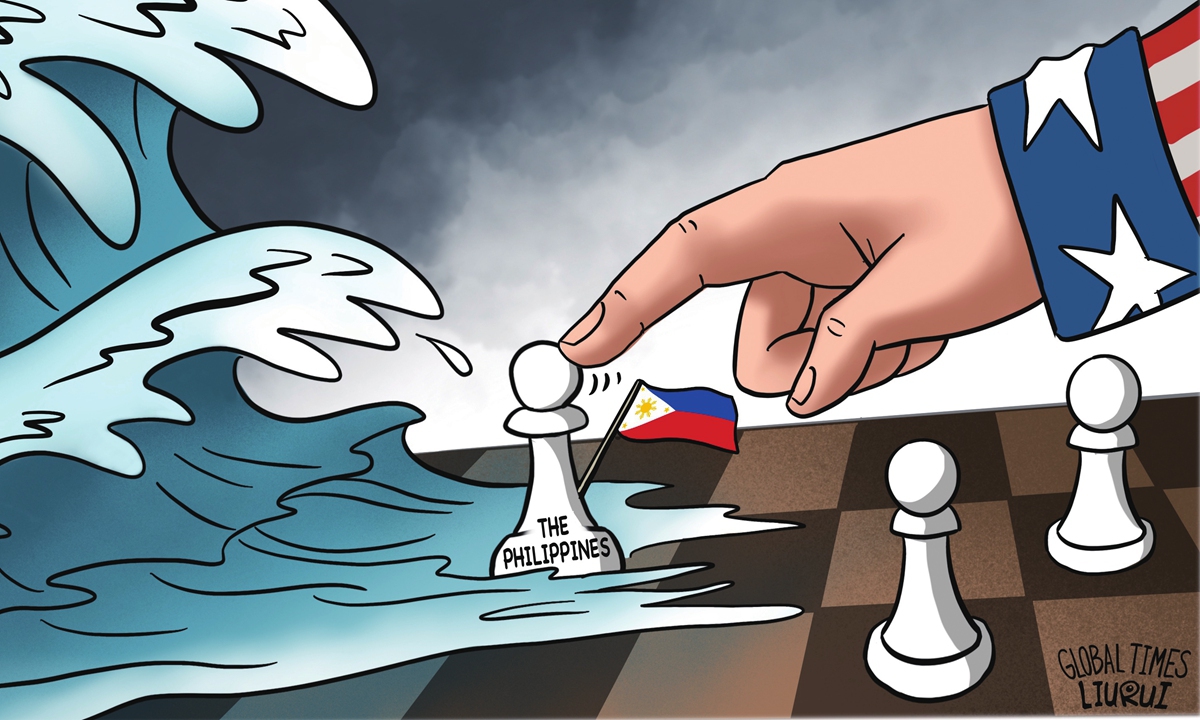
Illustration: Liu Rui/GT
Recently, the "US-Philippines+N" has become an important form of interaction for the US and its allies in the Asia-Pacific region. This includes hosting the US-Japan-Philippines trilateral summit and conducting joint military exercises involving the US, Japan, Australia, and the Philippines. Some even suggested replacing India in the Quad with the Philippines to form a "Squad." This approach is a key strategy for the Biden administration to strengthen relationships with allies, aiming to advance its "Indo-Pacific Strategy" and "shape the strategic environment" around China. Noticeably, the "US-Philippines+N" serves the US policy goal of containing and restricting China's rapid development, which will inevitably worsen the security, political and economic environment in the Asia-Pacific region.
The US and its allies are accelerating the militarization of the South China Sea, worsening the security environment in the region. First, the US is expanding its military presence in the Philippines. It is continuously encouraging and supporting the Philippines in illegally occupying territory in the South China Sea and creating friction with China. Second, the US and the Philippines, among other countries, frequently conduct military exercises in the South China Sea. The US hopes to strengthen the military capabilities of the Philippines and enhance its ability to provoke China. Third, the US supports allies in strengthening military cooperation with the Philippines. This year, the Philippines signed a memorandum of understanding on defense cooperation with Canada and signed the Reciprocal Access Agreement with Japan. Fourth, the US is deploying midrange missiles in the Philippines. Involving countries outside the region, such as the US, in South China Sea affairs has heightened tensions in the region, increasing the risk of military conflict in the South China Sea.
Furthermore, the US has deliberately smeared China, worsening the political environment in the Asia-Pacific region. American senior officials and government departments have offered "support" to the Philippines while repeatedly accusing China. By leveraging its dominance in international discourse, the US has fostered unfounded doubts and fears about China in the Asia-Pacific region, undermining China's efforts to peacefully resolve disputes in the South China Sea based on the Declaration on the Conduct of Parties in the South China Sea.
The US and its allies have been intensifying their presence in the South China Sea, promoting "values diplomacy" under the guise of "freedom of navigation," while undermining genuine freedom of navigation and maritime security. They invoke a "rules-based international order" to disrupt global stability and pressure regional countries into picking sides, which further destabilizes the political environment in the Asia-Pacific region.
Together with its allies, the US has pushed for a "decoupling" from China, worsening the economic climate in the Asia-Pacific. Furthermore, it frequently accuses China of "economic coercion" while integrating the Philippines into its Indo-Pacific Economic Framework. In addition, the US aims to reduce the Philippines' economic dependency on China, realign its semiconductor supply chains and counter the BRI. Finally, the US has connived the illegal grounding of Philippine military ships, causing severe damage to the ecological environment of the South China Sea. The South China Sea Ecological Center and the South China Sea Development Research Institute of China's Ministry of Natural Resources published A Survey Report on the Damage to Coral Reef Ecosystem by Illegally Grounded Military Vessel at Ren'ai Jiao on July 8. The survey found that the grounding process has inflicted fatal damage on the coral reef ecosystem, and its prolonged grounding state has greatly inhibited the growth and recovery of corals in the surrounding area.
The US and its Asia-Pacific allies are establishing various bilateral and mini-multilateral cooperation mechanisms primarily to serve US national interests. However, these countries possess different capabilities and varying levels of willingness to confront China. More importantly, these US allies and partners have their own national interests, and their cooperation with the US is largely about leveraging American power to maximize their benefits. Meanwhile, China's commitment to regional peace and stability, combined with its growing strength and influence, effectively counters the strategic pressure from the US and discourages more Asia-Pacific countries from taking sides. As a result, the US struggles to fully integrate its allies and partners, complicating its efforts to achieve its policy goals regarding China.
Sun Xihui is an associate research fellow with the National Institute of International Strategy at the Chinese Academy of Social Sciences and Wu Zongcan is an undergraduate student of University of Chinese Academy of Social Sciences. opinion@globaltimes.com.cn




